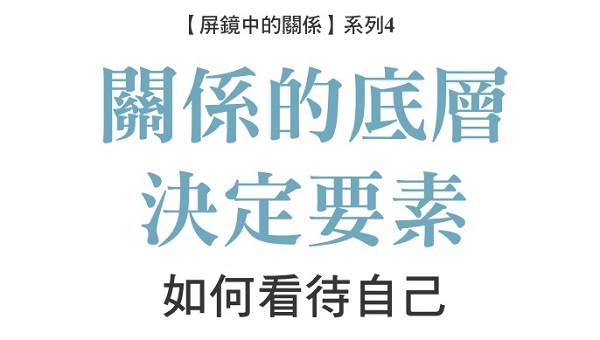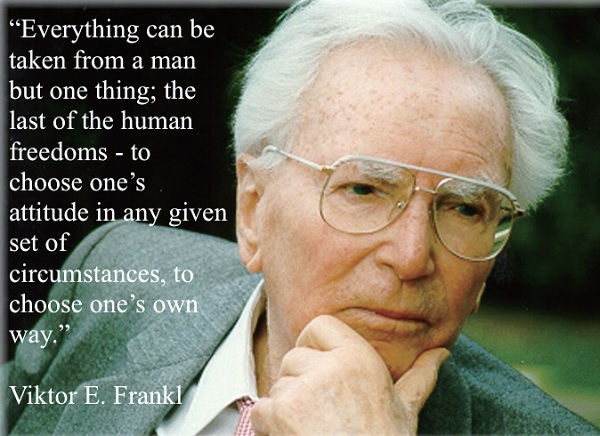underlying determinants of relationships
[Relationship in the Screen Mirror] Series 4 How to see yourself

The lowest determining factor of a person's relationship with others is how he views himself.
How does your perception of yourself affect your relationships?
When Xiao Hua (pseudonym) came to receive my coaching services, he was very angry, heartbroken and sad. Now the United States is not only swept by the new coronavirus, but also the political activities and disagreements in full swing are spreading like wildfire, and she is also involved. One of her friends called her "stupid" because of a disagreement with her, and blocked her on WeChat and broke up with her.
Shocked, then angry and sad: Friendship turns out to be so fragile and cannot tolerate different opinions! Is the friendship of the past many years real? She wanted to fight back.
The turning point was when she was able to return to her view of herself: "I am a person of great value. I have no enemies, only rivals, and I have only one rival: myself."
An in-depth discussion of "I am a valuable person" led her to the following conclusion: others make or break friendships based on their opinions of me. A view is an opinion, and everyone has the right to an opinion. I respect people's right to opinions, including my own and those of my former friends, but I don't necessarily have to agree with their opinions, and I don't have to be indignant. My ex-friend thinks I'm stupid, but that's just her opinion, and I have the right to stick to my own opinion.
Furthermore, everyone has the right to choose friends freely. Not being friends with me does not mean that I am not worthy, but that the two of us are not suitable for each other. Take a step back, even if the other person feels that they are not worthy, that is only the other person's point of view. Opinions do not equal facts.
Therefore, she can change from indignation to acceptance of her ex-friend's severance of friendship - accepting her ex-friend's right to opinion and choice of friends, but not agreeing with her view of herself, thereby being relieved of her anger and moving towards calmness.
"I have no enemies": This means that no matter how others view her, whether they break off diplomatic relations with her or regard her as an enemy will not affect her self-standing: there is no enemy - she does not regard this person as an enemy, let alone spend any money energy to fight with it. There are so many beautiful things in the world that are worth remembering. Her heart is selective and does not become an emotional trash can.
"I have only one opponent: myself." Focus on what you want to do, and make yourself more open, enriched, and better than yesterday. This allowed her to further detach herself from the impact of the breakup.
Therefore, looking at this event from the perspective of "who am I", a new "landscape" emerges. "Self-view" is like an anchor, stabilizing the churning boat of emotions. Next, you can receive coaching services related to friendship and other aspects, so that you can survive this dangerous shoal of friendship and deal with your ex-friends with a firm and peaceful mind. Interact with people in a common group.
She told me two things:
1. Because she didn’t fight back in anger, the relationship with her ex-friend didn’t get worse. It even provides the possibility of rebuilding their friendship.
2. Her attitude won the respect of others and gained more friendships based on recognition of her character and mind.
Interpersonal relationships often have a domino effect. In events that are caused by oneself, how we see ourselves is like the first domino. It happens in the heart, but it determines how we interact with others and how we collide with the next domino. And in incidents caused by others, it also determines whether it is the piece that will fall when touched, is stable enough, and becomes the shore that stops the waves, or an inflection point that allows the incident to turn around.
How we see ourselves profoundly determines: 1) how we feel in relationships; 2) how we manage our emotions; 3) how we behave and deal with interpersonal conflicts; 4) when the storms of life come, whether our focus is stable, etc. . This in turn will affect and even determine the direction of interpersonal relationships.

Types of self-views
1. How to view your core values
Core values - people's inherent sense of value. Since it is "inherent", it is independent of external factors. It is human dignity, embedded in the soul. Only by being able to affirm oneself at this level can a person have a deep sense of security. The fundamental starting point of how one behaves lies in who one is, not entirely in how others see or treat oneself.
For example, Xiao Hua, with the help of her coach, returned to the level of self-worth, that is, the core level of "who I am." As a result, her friends' favor and humiliation of her lost their power, and she responded to the breakup of friendship with a mature demeanor.
Psychologist Viktor E. Frankl, a survivor of the Nazi concentration camps, said: "In any given situation, people can choose their attitude." And how to choose is closely related to how you see yourself. The famous television evangelist Joyce Meyer and her brother came from the same troubled family, and her trauma was even more severe. Her positive influence spread all over the world, but her brother was addicted to drugs. He left the new life his sister helped him create and died alone in an abandoned building. What Joyce always held on to was her identity in Christ—the daughter of God. This is how she sees herself and how she chooses her life path. This often plays a decisive role in her various relationships with people, including her relationship with her father who sexually assaulted her.
If people cannot affirm their own core values, they often need more recognition from the outside world and are prone to fall into many relationship misunderstandings, such as:
‧Being a pleaser, a coward, someone who follows what others say, or prone to soft manipulation of others.
‧Being arrogant, bully, irresponsible, or prone to resorting to force control over others.
Of course, people are very complex, and everyone's human weaknesses have different "attacks". The difference is that people who can affirm their core values can return to the mentality and behavior that are consistent with this value, and build themselves up through this core value again and again, thereby establishing healthy interpersonal relationships. On the contrary, people who cannot affirm their core values are prone to lose their focus and themselves in the storms of life.

▲Interpersonal relationships often have a domino effect. How you see yourself is like the first domino. It happens in the heart, but it determines how you interact with others and how you collide with the next domino.
2. Whether the external value can be viewed in a fair way
In addition to the above-mentioned inherent value of human beings - an inner value that can stand toweringly independent of external circumstances and cannot be increased or reduced by external conditions. It cannot be measured by external conditions and is "unshakable." "Kingdom" (refer to Hebrews 12:28); in addition, people also have external, changing, and measurable value - the value related to skills and resources. These values can be exchanged with external things and can be "listed" and measured according to current circulation standards. For example:
1. Job skills. These skills meet certain needs and can therefore be exchanged to obtain what is needed for one's own life and development. It usually requires certain education and training to acquire, develop and enhance one by one.
2. The resources you have. For example, land, ideas, manpower (connections), experience, appearance, etc. can also be exchanged, can be measured, and can be "listed".
These peripheral values will participate in exchange and interweaving in interpersonal society, that is, they will exchange skills and resources with others and serve each other, thereby becoming a member who can contribute to society.
Interpersonal relationships are often built on the correlation and connection of peripheral values, such as work relationships (interweaving of skills), trade relationships (interweaving of resources), friend relationships (interweaving of ideas and interests), etc. The amount of these exchangeable and linkable resources and skills often determines a person's status and level in society. As a result, you will have a more objective view of the giving and taking, and the interactions between people, and will be less likely to fall into a fragile glass heart or a cynical and cynical mentality.
This can also explain an important reason why women have a very low social status when they are deprived of their right to education and restricted to the family. They are unable to obtain skills that can be exchanged and connected in the social system outside the family through education and training. In addition, social customs regard them as property rather than property owners. For example, the custom that daughters cannot receive inheritance also makes them have no rights. , there are not many resources to exchange and connect. The system that gives women educational rights, property rights, and voting rights gives women exchangeable value and connectivity, which plays a decisive role in improving women's social status.

▲Nazi concentration camp survivor and psychologist Viktor E. Frankl said: "In any given situation, people can choose their attitude."
Common misunderstandings about value
A common misunderstanding about value is that the external measurable value is equated with the inherent inherent value, and one cannot treat oneself and others impartially. Therefore, there is the phenomenon of being arrogant and arrogant, holding power and belittling others, or being condescending and flattering to power. This is Placing the value of measurable skills and resources over immeasurable inherent values, or even evaluating a person entirely based on these external values. “Whoever mocks the poor dishonors his Creator” (Proverbs 17:5), which means that a person’s lack of external resources is used to replace his inherent God-given value.
Unfortunately, inherent value is beyond the market because it is not exchanged in the market, so people who only value exchange value will be "blind" to it. The ugliness of various human natures may be displayed unabashedly, or may be staged in a disguised manner. This is true in individual lives, and may also be implemented in social systems. This is not unusual in history.
And those who can see the intrinsic value of people can be humble and courteous without being arrogant even when they are in a high position, or do not feel inferior when they are poor and embarrassed. They understand that people are equal in this sense. This inherent value is very clearly stated in the Bible: Man was created by God in His image, male and female alike (see Genesis 1:27).
Man's reflection of God's image is like a drop of water's reflection of the sea. On a microscopic level, it reflects the inherent dignity of God. There is no distinction between high and low in this image, and there is no distinction between gender, race, age, education, region, wealth, poverty and other conditions. A culture that believes that everyone is equal before God is more likely to have universal respect for people. In a culture that only sees the exchangeable value of people, "snobbery" is even more popular. Even people who believe in God, if they are not careful, will not be able to escape the influence of human hierarchical culture and continue to act snobbishly to a certain extent.

▲Our knowledge of who we are in Christ can determine how we choose the path of life.
What does fair self-worth bring?
If people can correctly view their own inherent value and exchangeable external value, they will be able to tolerate favors and disgrace. The inherent sense of value makes people understand that whether favored or humiliated, it is often caused by how others view one's peripheral value. It cannot touch the inner value, so it will not easily expand or shrink.
Those who can treat people's peripheral values in a fair way will respect the characteristics of such values, understand that they can be measured and can be exchanged fairly among people. When dealing with interpersonal relationships, they will have the following performance:
1. At work, employees will be dedicated and the boss will not treat employees badly. Because exchanges are fair, you get paid for your work, and you get rewards for your time. Only by providing value to others can you get the value provided by others, and only then can the relationship last for a long time.
2. In life, there is no need to take advantage. Reciprocate with courtesy and don't let others suffer. The same goes for family and friends. Do not take the contributions of family and friends as your natural rights. Blood relationship and love are not reasons for taking advantage. This is not to say that everything is based on exchange, but to know how to respect, know how to be grateful, and know how to repay. This is the connecting factor in the relationship.
3. To become a lifelong learner, to provide value, you need to have something valuable to offer, and learning is the way to improve your peripheral value. It also allows people to enjoy the fun of continuous "growth" in the process of life. At each level, you will encounter different "value landscapes" and gain new value.
A healthy self-concept is the basic element that determines the relationship between people and others, and includes two aspects:
1. Whether you can fully affirm and uphold your inherent value. This is the key to respecting others and not being embarrassed.
2. Whether you can have a fair understanding of your peripheral values. This is the basis for not treating others badly but also for continuous self-improvement and positive progress.
When we have a healthy self-view, our minds will become clear and concise, and it will be easier to have healthy interpersonal relationships.
Li Wenping, writer, life coach, editor-in-chief of Fengrong Online Magazine, special writer of this magazine, and former executive editor of this magazine. Think of yourself as a traveler - traveling in body, mind and spirit. The journey is also the purpose.
